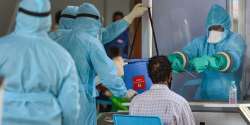Not all Covid patients have enough antibodies: Musk-led study
Billionaire Elon Musk has become a co-author of a study on Covid-19 where he joined researchers to track coronavirus infection in 4,000 SpaceX workers who came forward as volunteers. The findings suggest that only a certain threshold of antibodies may provide people lasting protection against the virus.

Billionaire Elon Musk has become a co-author of a study on Covid-19 where he joined researchers to track coronavirus infection in 4,000 SpaceX workers who came forward as volunteers. The findings suggest that only a certain threshold of antibodies may provide people lasting protection against the virus.
The study began last year when SpaceX was planning to send a manned mission into the sky.
To monitor the prevalence of the virus among SpaceX workers nationwide, "Musk and the rocket company's top medical executive worked with doctors and academic researchers to build an antibody-testing programme. More than 4,000 SpaceX workers volunteered for monthly blood tests," reports Wall Street Journal.
The results suggest that people who experienced fewer, milder Covid-19 symptoms generated fewer antibodies and were, therefore, less likely to meet the threshold for longer-term immunity.
The immune decision to generate a robust or weak response may occur at the time of the host-pathogen interaction, dependent on the level of viral challenge, or inflammatory cues.
"Low-level challenge may elicit only weak, poorly functional antibodies. Conversely, high-burden challenge may lead to the generation of a potent and functionally robust immune response, programmed to respond aggressively upon re-encounter with the pathogen," said the study appeared in the journal Nature Communications.
The results noted that unlike natural asymptomatic/mild infection, SARS-CoV-2 vaccines appear to drive robust immune responses.
Researchers observed some instances of reinfection in workers who previously were found to have low numbers of antibodies.
"People can have antibodies, but it doesn't mean they are going to be immune," Galit Alter, one of the doctors who co-authored and a professor of medicine at Harvard Medical School, told the Journal.
"The good news is most of the vaccines induce (antibody) levels way higher than these levels," Alter said.
The need for multiple rounds of immunization suggests that more antigen or boosting may be required to push the immune system to generate functional immunity that may be required for protection, the study noted.